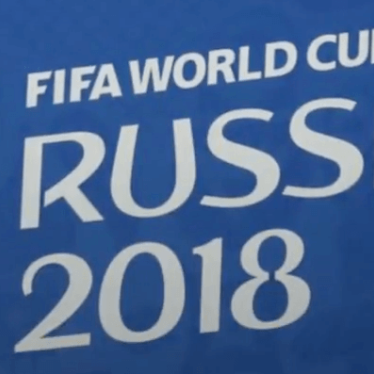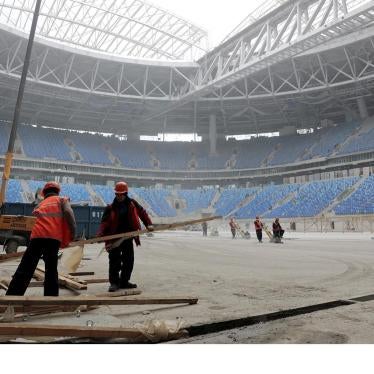February 12, 2018
Mr. Gianni Infantino
President, Fédération Internationale de Football Association (FIFA)
FIFA-Strasse 20
Zurich, Switzerland
Re: Human Rights Defender in Chechnya, site of Team Base Camp for Egypt
Dear Mr. Infantino,
We recently learned that FIFA confirmed Grozny as the Team Base Camp for Egypt and wish to share with you our concerns about the dire state of human rights in the Chechen Republic. You have previously received information about the serious violations that took place against gay men in Chechnya in 2017, and the continued serious threat to the security and lives of Chechnya’s LGBT community. Most recently, Chechen authorities have turned their focus again on human rights defenders in the republic, jailing leading defender, Oyub Titiev, and intensifying their attacks on the prominent Russian human rights organization he works for, Memorial.
We believe that FIFA intervention with Russian authorities on the dire human rights situation in Chechnya, and in particular on the attack on Titiev and Memorial, would not only be consistent with the commitment in article 3 of FIFA’s statutes to promote the protection of international human rights, but would exemplify its determination to implement its new Human Rights Policy.
Background on Chechnya
For the past decade, the leader of Chechnya, Ramzan Kadyrov, has eradicated even the mildest dissent through brutal repression; whether directly through his officials or proxies acting with impunity, human rights defenders have been threatened, beaten, killed, and their offices repeatedly torched. Kadyrov’s security forces preside over extrajudicial killings, enforced disappearances, and collective punishment against suspected Islamist militants. In May 2017, the Sports and Rights Alliance wrote to you about the anti-gay purge that was underway in Chechnya, in which Chechen police rounded up, tortured, and humiliated dozens of presumed gay men. Human Rights Watch has worked on Chechnya since the early 1990s, and we have documented these abuses extensively.
President Putin is Kadyrov’s patron and Kadyrov rules in this manner with the Kremlin’s tacit support.
FIFA Can Make A Difference
Based on our experience in the region, we are concerned that Kadyrov will take advantage of Grozny being chosen as the location for a training camp for one of the World Cup teams to boost his credibility and prestige, such as through availing of photo opportunities, and suggesting the choice of location comes with the prestige of FIFA’s imprimatur on his leadership.
FIFA has said its Human Rights Policy reflects its expectations of a wide range of entities linked to FIFA through their activities, and that FIFA would “go beyond its responsibility to respect human rights” including by taking “measures to promote the protection of human rights and positively contribute to their enjoyment, especially where it is able to apply effective leverage”. Under Pillar III of its policy, “Protect and Remedy”, FIFA commits that “where the freedoms of human rights defenders … are at risk, FIFA will take adequate measures for their protection, including by using its leverage with the relevant authorities.”
FIFA now has an opportunity to use its leverage with the Russian authorities to help protect Titiev and Memorial, putting into operation the commitments above and making clear that rather than FIFA’s engagement in a region being used to detract attention from serious human rights violations and repression, its engagement can help promote and protect human rights.
FIFA responded to the spring 2017 anti-gay crackdown in Chechnya, and we are convinced you can make a difference now by intervening directly with President Putin in Titiev’s case.
Oyub Titiev is the 60-year-old Grozny Office Director for Memorial. On January 9, Chechen police arrested Titiev, planted marijuana in his car, and pressed false drug possession charges against him. Authorities are targeting him to retaliate against his human rights work, and to push Memorial out of Chechnya. Two separate arson incidents against Memorial property in the region took place the week after Titiev’s arrest. Titiev remains in custody pending trial and faces a maximum 10-year prison sentence.
On February 7, Titiev’s case was transferred from the Chechen investigative agency to the regional investigative agency, at the request of Russia’s federal ombudsperson, and over the objections of Kadyrov. This is a positive sign. However, only sustained international engagement can spare Titiev from a prison sentence and make it possible for Memorial to continue their important work in Chechnya.
Titiev’s conviction, should a trial go forward, and any forced closure of Memorial in Chechnya will be a scandal that would cloud the 2018 FIFA World Cup, not simply because Chechnya will be Egypt’s Team Base Camp, but also because Ramzan Kadyrov, a passionate football fan, is likely to be a VIP at matches. We are also concerned that any forced closure of Memorial would embolden Chechen authorities to crack down further on journalists, critics, and human rights defenders.
We thank you for your attention and look forward your swift response.
Sincerely,
Minky Worden
Director
Global Initiatives
Human Rights Watch
Jane Buchanan
Associate Director
Europe and Central Asia Division
Human Rights Watch
Annex: The Case of Oyub Titiev and Memorial
Oyub Titiev is the Grozny office director for Memorial, Russia’s leading independent human rights organization, which has worked in Chechnya for 25 years. [. . .]
The day after Titiev’s arrest, police raided his home looking for his brother and son. Enraged by the fact neither was in Chechnya, the officers kicked the female family-members out of the house, locked it, and took the key. Titiev is the successor to Natalia Estemirova, the former Memorial representative in Chechnya, who in July 2009 was taken away in a car by security officials in Grozny, only for her riddled body to be recovered later that day.
On January 17, masked arsonists set fire to Memorial’s office in neighboring Ingushetia, which senior Memorial staff, who had flown from Moscow to work on Titiev’s case, had been using as a base. Fortunately, no one was injured, but most of the office was destroyed. On January 22, arsonists set fire to an automobile belonging to a Memorial local driver, which had been used by one of Titiev’s lawyers. The next day, Memorial received text messages ordering them to stop their work, lest the office be burned with the team members in it. The messages also said that the torched vehicle had served as a warning. Following the text messages, Memorial also received a phone call reiterating the threats.
Since 2014, two other critics of Chechen authorities were convicted on false drug charges and served prison terms. One is Ruslan Kutaev, who was sentenced in 2014 to four years in prison on fabricated, politically motivated drug charges after he criticized and disobeyed an order by Ramzan Kadyrov. Kutaev was paroled in December 2017. The other is Zhalaudi Geriev, a journalist who reported for Caucasian Knot, an online outlet that reports extensively on Chechnya and that has criticized Chechnya’s leadership. In 2016, Geriev was sentenced to three years in prison on fabricated drug charges.







